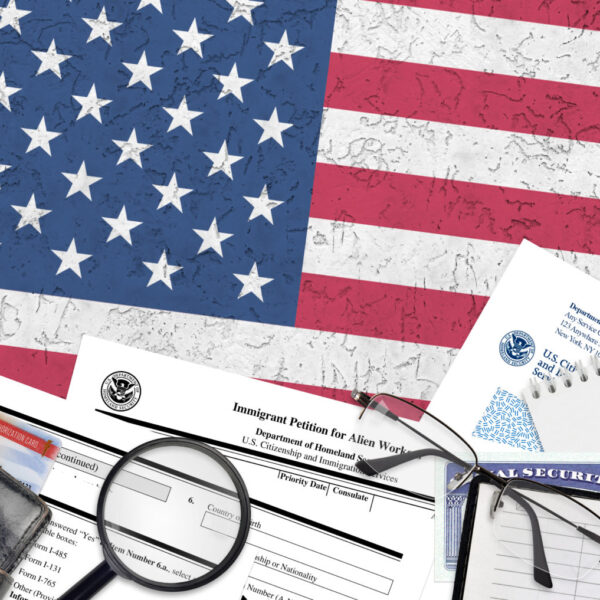
As an experienced immigration attorney in Phoenix, Roya Habich understands the profound significance that an I-601 waiver for a qualifying relative holds for individuals seeking a brighter future in the United States.
The I-601 Waiver is not just any document; it is an opportunity to waive certain grounds of inadmissibility to obtain the immigrant visa, green card, or certain non immigrant statuses. In this article, we’ll discuss this waiver application process.
What is an I-601 Waiver and What Can It Accomplish?
The Form I-601, Application for Waiver of Grounds of Inadmissibility, is a form to apply for a waiver. This waiver is a crucial recourse for immigrants facing challenges on their journey to obtaining a green card in the United States. It serves as a lifeline for individuals who have encountered a denial of admissibility based on specific grounds and have a spouse, or parents who are U.S. citizens or lawful permanent residents.
Understanding the Basis for Inadmissibility
A “ground of inadmissibility” is a factor that will prevent an applicant from obtaining a visa or green card. The U.S. government uses inadmissibility to prevent harmful immigration and protect its citizens. Due to a ground of inadmissibility, the U.S. Department of State may deny an individual’s immigrant visa or nonimmigrant visa, U.S. Customs and Border Protection may deny an individual entry into the United States, and the U.S. Department of Homeland Security may deny a change of status. Essentially the term “inadmissibility” refers to specific circumstances or conditions that, according to U.S. immigration laws, render an individual ineligible for entry or adjustment of status.
Common grounds for inadmissibility include unlawful presence, criminal history, previous immigration violations including misrepresentation or fraud, contagious medical diseases or lack of necessary vaccinations.
The U.S. government will not grant waivers for any of the following grounds:
- Substance abusers or drug addicts
- Drug traffickers
- Spies
- Terrorists
- Nazis
Each of these factors poses unique challenges, requiring a tailored approach to address them effectively. The I-601 waiver covers a broad range of inadmissibility issues. Unraveling the intricacies of the basis for inadmissibility is the first step in navigating the I-601 journey.
It’s not just about overcoming legal hurdles; it’s about understanding and addressing the core issues that stand in the way of your American dream.
The Significance of the I-601 Waiver
The I-601 waiver allows individuals to address the basis for inadmissibility and present a compelling case. Its significance lies in providing an opportunity for immigrants to overcome obstacles, reunite with their families, and pursue a better life in the United States.
Learn more about family-based immigration services at Habich Law.
Crafting a well-documented and truthful argument is not just a requirement but may determine whether an individual can become a permanent resident of the United States.
Understanding the I-601 Waiver
Purpose of the I-601 Waiver
The purpose of the I-601 Waiver is to provide individuals facing inadmissibility issues, such as denial of a green card application, with an opportunity to address specific grounds for inadmissibility.
It serves as a means for eligible applicants, including spouses, fiancés, and parents of U.S. citizens, to present a compelling case, demonstrating circumstances that warrant an exception and a chance for a better life in the United States.
Eligibility Criteria for Applicants
Eligibility for the I-601 Waiver is typically extended to foreign nationals with a U.S. citizen or lawful permanent resident spouse or parent. Qualification hinges on the specific grounds for inadmissibility, and the role of legal representation is to align unique circumstances with the eligibility criteria, paving a clear path forward.
How the process works:
1. Download the Most Recent I-601 Waiver Form
The Form I-601, “Application for Waiver of Grounds of Inadmissibility” can be found on the official website of U.S. Citizenship and Immigration Services (USCIS.gov). You can access the form, along with instructions for completion, on the USCIS Form I-601 page. It’s crucial to use the most recent version of the form and follow the provided guidelines to ensure accurate and up-to-date submission.
2. Complete the I-601 Waiver
Do this as accurately as possible and provide all of the supporting documents explaining the reasons for the initial denial. It’s akin to assembling a puzzle where every piece matters. Given the complexities, having an experienced immigration attorney is recommended to ensure the form is filled out correctly and all necessary elements are in place.
3. Supporting Documents may include
- Personal Identification:
- Copy of passport bio-data page.
- Birth certificate.
- Evidence of Relationship:
- Marriage certificate (if applying as a spouse).
- Birth certificates of children (if applicable).
- Proof of U.S. Citizenship or Legal Residency:
- U.S. citizen or legal resident spouse or parent’s citizenship or residency proof.
- Financial Documents:
- Tax returns.
- Pay stubs.
- Bank statements.
- Evidence of Inadmissibility Grounds:
- Documentation related to the specific grounds for inadmissibility (e.g., unlawful presence, criminal records).
- Affidavits and Letters of Support:
- Affidavits from friends, family, or community members supporting your case.
- Letters explaining the hardship from the qualifying relative.
- Medical Records:
- If relevant, medical records indicating a qualifying relative’s health condition.
- Country Conditions Documentation:
- Information about the political or social conditions in the home country that might contribute to hardship.
- Criminal History Records:
- Police certificates or records for any criminal history.
- I-601 Filing Fee Payment Evidence:
- Proof of payment for the filing fee.
- Legal Representation Documents:
- Retainer agreement or letter of representation from your immigration attorney.
Timeline for Filing
File your I-601 as soon as possible after denial.
Timelines and processing times for the I-601 Waiver application can vary, and they are influenced by several factors, including the workload of the USCIS office handling your case and the specific circumstances of your application. USCIS typically provides estimated processing times on its website. At the time of this writing, their estimated time was that 80% of cases were completed within 22 months.
Qualifying Relatives and Their Importance:
A qualifying relative, in the context of the I-601 Waiver, is a crucial element determining the eligibility for overcoming grounds of inadmissibility. These individuals, pivotal to the waiver application, may include U.S. citizen or legal resident spouses, parents, and children.
In cases of spouses, demonstrating a genuine and ongoing marital relationship is crucial.
Additionally, proving the emotional, financial, or medical dependence of parents or children can be challenging, and any missteps in presenting this evidence may impact the success of the application.
The intricate nature of familial relationships requires a nuanced approach to highlighting the unique aspects that contribute to the potential hardship faced by the qualifying relative.
As we navigate this path, attention to detail and a comprehensive understanding of familial dynamics become paramount. Seeking guidance from an experienced immigration attorney ensures that these roles are accurately portrayed, minimizing the risk of misunderstandings that could lead to a denial of the I-601.
Hardship Factors: Proving Extreme Hardship:
In the context of the I-601 Waiver, demonstrating extreme hardship is crucial. Let’s take a closer look at the challenges families can face without getting too complicated.
Medical Needs:
Sometimes, a person has serious health issues that need ongoing treatment only available or affordable in the United States. If they are denied the waiver, dealing with these health problems becomes even harder.
Political Instability:
Sometimes the foreign country has political instability and it is not safe to return.
Caregiving Responsibilities:
Sometimes the foreign national is the main person taking care of elderly family relatives, ill relatives, or young children in the family. Without this support, the entire family may suffer as well as the qualifying relative.
Educational Interruptions:
The foreign national may be in school with significant school loans. Without completing their degree or having the opportunity to pay off their loans will cause undue hardship to the entire family.
These are real challenges families face, and the goal is to explain them clearly to help others understand how difficult it can be when a waiver is denied.
Ineligibility for Waiver:
Certain situations may render filing for an I-601 waiver impossible. If you’ve been in the U.S. unlawfully for more than a year, departed, and then reentered without inspection, or if you made a false claim of being a U.S. citizen without a reasonable basis, waiver options might be limited.
Moreover, membership in a criminal gang, specific drug convictions, failure to attend a removal hearing after being in the U.S. for at least five years, involvement in a sham marriage, or filing a frivolous asylum claim are also circumstances that may impact eligibility.
Alternatives for Entry: Paving Different Paths
Even if the I-601 waiver isn’t an option, alternative avenues for entry may exist. It’s crucial to explore these alternatives based on your specific situation. Understanding the nuances of other entry options and consulting with an immigration professional can help you navigate through complex scenarios.
Common Mistakes to Avoid: Navigating Pitfalls
Applying for an I-601 waiver comes with potential pitfalls. Common mistakes, such as insufficient evidence of extreme hardship or overlooking specific eligibility criteria, can lead to delays or denials. It’s essential to be aware of these pitfalls to enhance the chances of a successful application.
Tips for a Smooth Application Process: Steering Clear of Errors
To avoid errors that could result in delays or denials, follow these tips:
- Thorough Documentation:
Ensure all required documents are complete, accurate, and well-organized. Missing or incomplete documentation can be a significant stumbling block. - Accurate Information
Ensure all information provided is accurate. Providing incorrect or untrue statements will only hurt your chances of approval causing additional issues and setbacks. - Understanding Eligibility:
Familiarize yourself with the specific eligibility criteria. Misinterpretation or oversight can jeopardize the application. - Legal Guidance:
Seek advice from an experienced immigration attorney. Professional guidance helps navigate complexities and ensures adherence to legal requirements. - Timely Filing:
Submit your application in a timely manner. Sometimes the I-601 waiver may be concurrently filed with applications to adjust status. Delays can impact processing times and may lead to complications.
Tracking Changes and Costs
By being aware of potential challenges and incorporating these tips, you can enhance the quality of your application and minimize the risk of setbacks in the I-601 waiver process.
- Keeping abreast of recent updates and shifts in immigration policies is crucial for a successful I-601 process. Changes in regulations or policies can impact your application, and staying informed ensures you can adapt effectively. Regularly check official immigration sources or consult with your legal representative to remain up-to-date on any alterations that may affect your case.
Financial Considerations: Understanding the Costs
- Understanding the financial aspects of the I-601 process is essential for effective planning. This includes filing fees and legal representation costs. The breakdown of these expenses helps applicants prepare adequately for the financial commitments involved.
Filing Fees: Navigating Costs
- The I-601 process involves filing fees set by USCIS. Knowing the current fee structure and ensuring timely payment is crucial. Additionally, seeking legal representation comes with its own costs, and understanding these fees is vital for budgeting. You can see the current fee on this page at USCIS.gov.
Fee Waivers and Financial Assistance: Exploring Options
- Recognizing that financial constraints can be challenging, explore available fee waiver options or financial assistance programs. Some individuals may qualify for fee waivers based on their financial circumstances. Legal aid organizations or immigration services may offer assistance programs to help alleviate the financial burden.
- By staying informed about policy changes and understanding the financial landscape, you empower yourself to navigate the I-601 process more effectively. Adapting to policy shifts and addressing financial considerations strategically contribute to a smoother and more informed journey through the waiver application process.
Navigating USCIS Communication: A Key to Success
Effective Communication with USCIS:
The following is some guidance on how to communicate effectively with USCIS:
- Clear and Concise Communication:
When reaching out to USCIS, be clear and concise in your communication. Use simple language and provide all the necessary details. Think of it like telling a straightforward story to make sure they understand. - Timely Responses:
If USCIS asks for more information or clarification, respond promptly. This helps keep the process moving. It’s like answering a friend’s question quickly to keep the conversation going. - Use Official Channels:
Stick to official channels when communicating. This means using the USCIS website or mailing addresses provided.
Checking Application Status: Keeping Tabs on Progress
Knowing how to check the status of your application is like keeping tabs on a package you’ve ordered online. Here’s how you can do it:
- Online Status Check:
Use the USCIS online system to check your application status. It’s like tracking a package online to see where it is and when it will arrive. - Case Status Updates:
USCIS will provide updates on your case status. Pay attention to these updates, like receiving notifications about your online order being processed or shipped.
Addressing Requests for Additional Information: A Collaborative Effort
Sometimes USCIS might need more information. It’s like a friend asking for more details to understand your story better. Here’s what to do:
- Prompt Response:
If USCIS requests additional information, respond quickly. It’s like answering a friend’s follow-up questions to make sure they get the whole picture. - Consult Your Legal Representative:
Having legal representation is like having a guide on this journey. If USCIS requests information, consult with your attorney before responding. They can help ensure your response aligns with legal requirements.
Remember, effective communication with USCIS is like having a conversation – be clear, responsive, and use the right channels. Having legal representation is your reliable companion, providing guidance to ensure your words and actions contribute to a successful application process.
Potential Delays and Challenges:
It’s crucial to grasp that the I-601 process may encounter delays and challenges, much like anticipating occasional road bumps during a journey. Here’s a practical approach to keep things steady:
- Realistic Expectations:
Accept that delays can occur. It’s akin to acknowledging the possibility of unexpected traffic during a road trip. Patience is key, recognizing that the process may take up to 2 years or even longer. - Tips for Managing Expectations:
Stay informed to manage expectations. Regularly check for updates on your case, similar to tracking a package online. Trust the process, understanding that, like a package arriving a bit later than expected, your case is progressing. - Navigating Uncertainties:
Embrace uncertainties as part of the journey. Just like not knowing the exact arrival time on a road trip, stay flexible and adaptable. You’re moving forward, even if the timeline might be longer than initially anticipated.
Remember, encountering delays and challenges doesn’t mean you’re veering off course. It’s an integral part of the process. By managing expectations, staying informed, and adapting, you’ll navigate through them like a seasoned traveler on a longer-than-usual journey.
Post-Approval Considerations: What Happens Next
After your I-601 waiver is approved, the journey continues toward obtaining a green card. It’s like reaching a checkpoint in a game – here’s what to expect:
- Approval Celebration:
Once your waiver is approved, it’s a moment to celebrate! Acknowledge your progress and the effort put into the process. - Green Card Pathway:
The next step is pursuing a green card. Be sure to provide any remaining items for the application to adjust status or the immigrant visa. - Navigating Immigration Steps:
Navigating immigration steps post-approval is like advancing through game levels. Work with your legal representative to understand the specific steps involved in obtaining your green card. - Patience and Persistence:
Patience is key in this phase, similar to waiting for the storyline to unfold in a game. Continue following the guidance of your legal representative and persevere through the remaining steps.
Remember, just like a game with different levels, obtaining a green card post-approval is a progression. Stay focused, and with the right guidance, you’ll successfully advance to the next phase of your immigration journey.
Conclusion: Navigating the I-601 Journey with Confidence
In concluding this guide on Navigating I-601 Waivers, it is crucial to underscore the significance of having legal representation by your side.
The I-601 process is intricate, with potential challenges and delays that require careful navigation. Therefore, our strong recommendation is to enlist the expertise of experienced immigration lawyers who can guide you efficiently through each step.
Facing immigration challenges can be daunting, but with the right support, the journey becomes more manageable. An experienced attorney, like Roya Habich, brings valuable insights, ensuring your application is well-prepared and aligned with legal requirements. She will act as your reliable ally, helping you overcome hurdles and anticipate potential pitfalls.
If you find yourself on this immigration journey, facing uncertainties or seeking clarity, we encourage you to reach out to Habich Law.
Our dedicated team is here to offer assistance, providing the expertise needed to navigate the complexities of the I-601 process and other immigration processes. Remember, with the right support, your path to a better future becomes more certain. Contact us today, and let us help you navigate the way forward.




